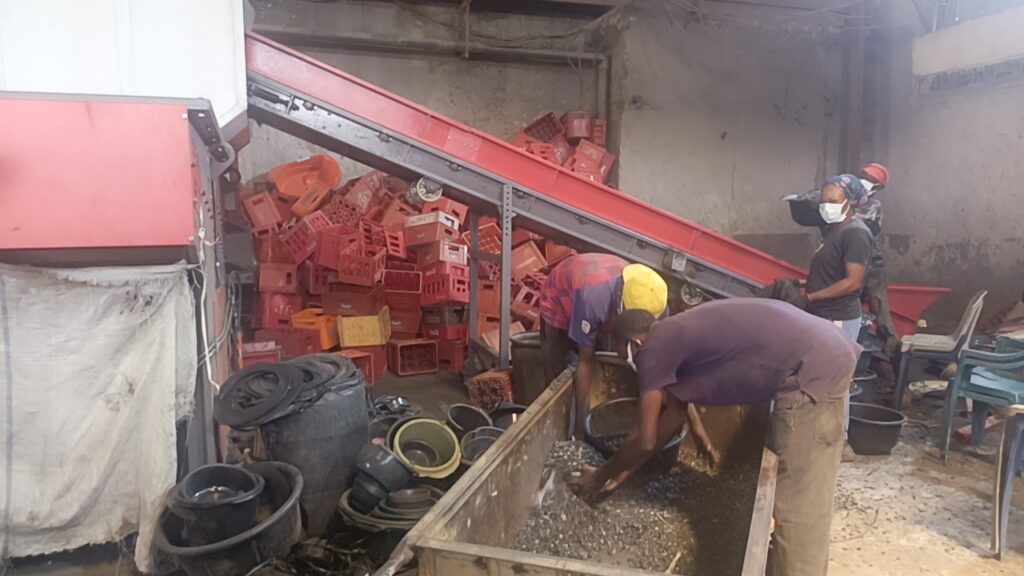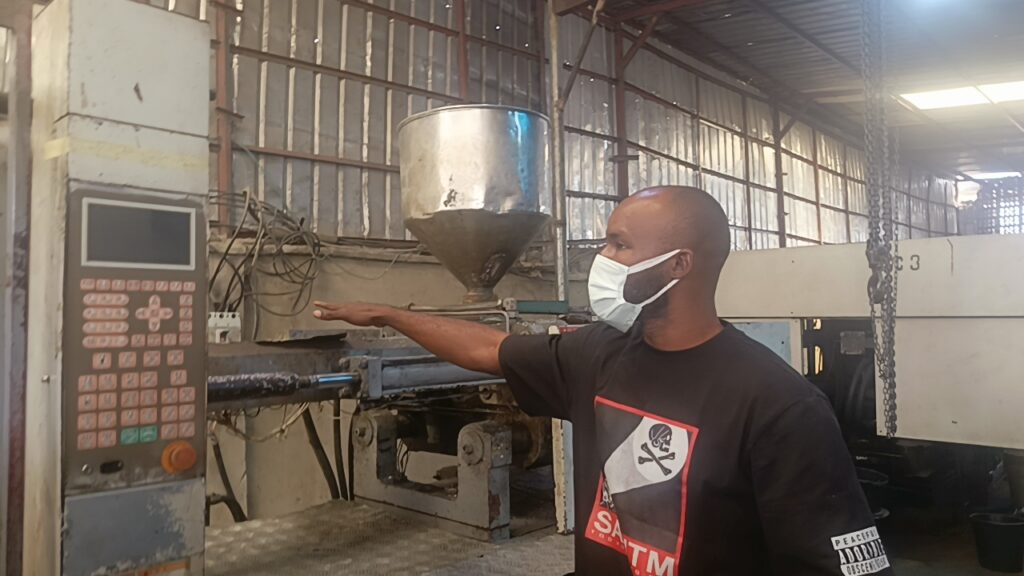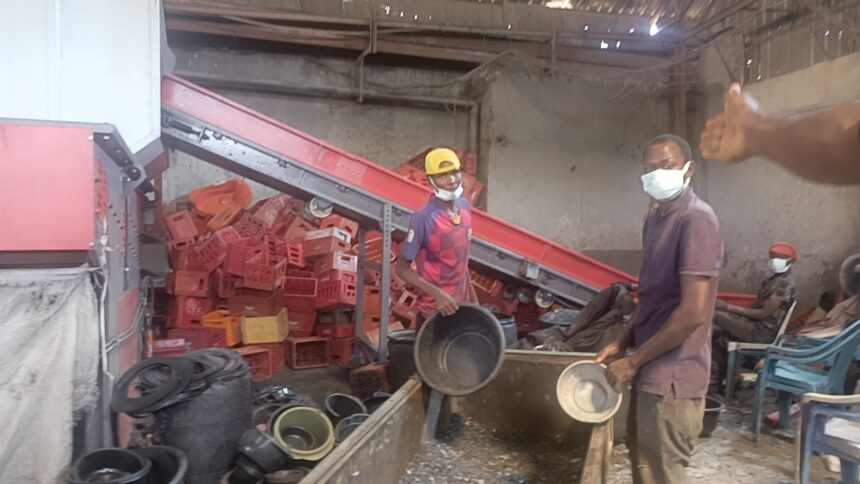● Ex-SSG, Don, Prominent Lawyer Lead Protests Against Niger Factory’s Activities
• Factory owner dismisses accusations, claims possession of NISEPA, NISREA, EIA certifications
A storm is brewing in Gidan Madara, an estate once defined by its tranquil ambience in the Minna metropolis in Niger State. A factory, Golden Age Table Water and Polymer Nigeria Limited, are allegedly polluting the air with emissions from its plastic recycling operations. While the factory presents itself as a bastion of environmental responsibility, residents paint a starkly different picture of respiratory ailments and environmental degradation. … CONTINUE READING


Located in the heart of a residential area, the factory produces bottled water, sachet water, and a variety of plastic items like buckets, basins and cutlery. But a development that should have been a symbol of industrial progress has become a source of anguish as residents accuse the factory of compromising air quality with emissions that threaten their health and the environment.
A petition signed by 45 residents, including prominent figures like former Secretary to the State Government Alhaji Ahmed Matane, Mr Lucky Barau, Barrister Bawa Wuse and Prof. Salihu Niworu, reveals the gravity of their plight. Titled “Petition for Quick Intervention to Save Our Souls from Noxious Chemicals, Plastic Fumes, and Soot Pollution,” the petition the petition reads: “The ambient air quality at Gidan Madara and Dadin Kowa Estate has been degraded.
“Nigeria ranks third among 10 countries with annual premature air pollution-related deaths.
“This is the environmental injustice that we, the residents of Gidan Madara and Dadin Kowa Estate, have suffered from the Golden Age Plastics Melting and Recycling facility since 2019.
“All efforts made to get the proprietor of the factory to stop air pollution with noxious chemicals, plastic fumes and soot has failed. He is suffocating us and killing us gradually while he goes home to enjoy clean air.
“We are exposed to risks of blood poisoning and premature death from cardiovascular organ failure.
“We suffer asphyxiation (insufficient oxygen) day and night, and some residents of Gidan Madara have already developed respiratory diseases like asthma, chronic catarrh, cough, chest pain and insomnia.
“There is no guarantee that the innocent students of Himma International College, Redeemer’s Academy, Royal Ideal Schools, frequent visitors to Trade Fair complex, casual employees in Golden Age water factory, our children and grandchildren will ever live productive lives, having had their organs contaminated with toxins, furans, dioxins and hard metals that are carcinogenic and capable of endocrine disruption.
“It is noteworthy that Gidan Madara layout is not an industrial layout. Thus, we have appealed to relevant federal and state agencies which are capable of protecting the environment and enforcing environmental standards and guaranty the rights of all Nigerians to enjoy clean air but they failed to stop the environmental injustice for overriding public health interest or compel him to remove the plastics recycling plant from residential area since 2019.
“The mutation of Gidan Madara water factory to a plastics recycling facility in a predominantly residential area is an aberration in the 21st Century, abuse of privileges in a peaceful neighbourhood and blatant insult to Mr Governor’s New Niger and Urban Renewal Initiatives.
“Justice is a virtue, hence our quest for environmental justice. We appeal to the Commissioner to protect our fundamental human rights to life and inalienable access to clean air in tandem with SDG 3 for good health and well-being.
“We are not opposed to investment but utterly reject any investment that threatens our health and right to life. We have endured enough.
“For peaceful co-existence in the neighbourhood, kindly save us from further pollution and premature death. We cannot enjoy quality sleep at night or fresh air in the daytime. We are dying gradually.”
The factory, the residents argue, represents an environmental injustice in a country that already ranks third globally in annual premature deaths due to air pollution.
The human toll
Abdullahi Bawa, a resident, shared a heart-wrenching account of how the factory’s emissions aggravated his wife’s asthma, ultimately leading to her death.
“If you have a health condition and continue inhaling these emissions, it will worsen over time,” he said.
He said although the factory claims to be recycling plastics cleanly, plastic recycling ought to be done in an industrial area and not a residential area, adding that its activities have continued to constitute a threat to their lives.
Bawa said: “Why would someone processing water suddenly turn into recycling plastics and thereby polluting the whole community with all his particles?
“Plastic recycling is not supposed to be done within a residential area; it is supposed to be done within an industrial area.
“We have approached him several times and he has continued. That is why we had to write the petition.
“If they were producing now, you would see how they pollute the air. Emissions from the factory are disturbing the entire community.
“We have talked to them and spoken to some appropriate authorities but nothing has been done. They are killing us silently.
“The factory has been emitting smoke and the owner told us that he had actually stopped the emission. But the smell is still there.
“I don’t know whether one can filter air thoroughly in such a way that it won’t be harmful to the community when you are melting something there. “
Asked for evidence that the operations of the factory threatened their lives, Bawa stated that his wife’s asthma condition was aggravated when the factory began the recycling operations, adding that the development culminated in her death.
He said: “Personally, I am a victim. I lost my wife. She had been having asthma problems for long but it was during these emissions that it became more severe.
“We were frequently in the hospital for treatment. Suddenly, she went to a naming ceremony where she had an attack.
“If you have a health related problem and you continue inhaling this thing for some time, it will aggravate the condition, whether you like it or not. I am also a victim.
“The pollution is killing people gradually. The owner does not live here with us. He would only come for a few hours and go away while we inhale this thing morning, afternoon and night.
“Inasmuch as he is producing, there must be pollution coming out from the factory.”
Another resident, Mr Lucky Barau, said the pollution from the plastic factory had worsened and had caused most of the residents their night rest,
“We cannot sleep. This is getting too much. My wife is asthmatic and her asthma is back. We have to close our windows any time he is doing his production,” he said.
Another resident who wished to remain anonymous emphasised the community’s main demand: the cessation of plastic recycling operations in their residential area.
“We have no problem with the water production; it is the plastic recycling that is killing us,” he said.
Global epidemic
The controversy in Gidan Madara underscores a broader issue—plastic pollution. According to the United Nations, the world produces over 300 million tons of plastic annually, with 14 million tons ending up in the ocean each year. In Nigeria, the problem is particularly severe as inadequate waste management systems struggle to cope with mounting plastic waste.
The health risks are alarming. A 2021 study revealed that plastic-related pollution contributes to respiratory illnesses, cancers and cardiovascular diseases. Microplastics, often released during recycling processes, infiltrate the food chain, posing risks even to those far removed from industrial hubs.
Golden Age factory’s defence
The factory’s owner, Okoli Antony Chidi, however, vigorously defended its operations, insisting that the facility employs modern, environmentally friendly technology.
“We don’t burn plastics; we recycle them using state-of-the-art technology,” he said, pointing to a ₦4.4 million extractor installed to prevent harmful emissions.
Chidi added: “The relevant agencies have come and checked and I don’t think there is anything substantial they have seen that we are deteriorating the environment.
“And I am confident they won’t see anything because I ensure that I comply with all procedures and processes to ensure that we keep the environment safe and clean. I have all the certifications from NISEPA, NISREA and EIA.”
Chidi also dismissed allegations of health risks, claiming that none of his workers had reported significant illnesses. He attributed the community’s outcry to personal vendetta, particularly targeting one neighbour, Mr Lucky Barau, who he alleges holds a grudge over unrelated disputes.
He said: “My staff (members) have not fallen sick in recent times. We are all here and we are all strong and we have never had any major sickness; not even malaria or typhoid.
“Even the neighbours that are complaining, I doubt if any of them has fallen sick and it was attributed to the activities of my factory.”
Chidi explained that the factory has a dumpsite where they collect and clean the plastic before bringing it to the factory for recycling, “People say we burn, but there is nothing like burning in recycling, because any material you burn, you are damaging it and it won’t work anywhere. What we do is melt and turn it into the product we desire.
“We have had relevant organisations visit us and given us a clean bill. They have inspected all we do and they do not have any problem with it. I don’t think the process we are doing here is harmful to human health. We don’t burn; we only recycle,” he said.
He further claimed that the accusations and petitions stem from a personal grudge, alleging that a former official of the Niger State Environmental Protection Agency (NISEPA) was using his influence to disrupt the factory’s operations.
“This is not about pollution but vendetta,” he said.
“One of the neighbours, Mr Lucky Barau, requested to connect the light to my transformer and I told him I am not the sole owner of the transformer. The transformer is being used between Golden Age and TY Plastic which is sharing a fence with him.
“The man said he would not allow Mr Lucky to take light from our transformer. So I went back and told him that the transformer is already overloaded and if he connects, other neighbours would want to also connect and the voltage would not be enough for our operations. I told Mr Lucky to see what he could do to get his own transformer.
“I did not know he felt so offended. After some months, he started making trouble that the factory was polluting the environment.
“After several checks by relevant authorities, he was silent for a while. But with the emergence of this new government, he started again.
“All relevant authorities have come and inspected and checked my factory and did not see anything wrong with our operations and activities.
“We are not causing harm to the environment. We don’t have any pollution here. So i don’t know what he is seeing that I am not seeing even though I am more a professional environmentalist than him.
“It is as if he is still hurt.”
Barau counters Chidi’s claims
But Barau refuted Chidi’s claims, labelling them “cheap blackmail.”
“The pollution started in 2019. We didn’t even know where the smell was coming from at first. By 2020, we realized it was from the factory,” he said.
Barau stressed that the petition was signed by numerous respected figures, highlighting that the grievances are collective and not personal.
He argued against the environmental and health hazards caused by the factory’s operations, which release toxic fumes and soot into the air, severely affecting his asthmatic wife and the neighbourhood. Barau detailed the dangers of plastic fumes, which he said cause respiratory issues and long-term health risks, including cancer. He mentioned coughing up soot daily and the worsening of his wife’s asthma due to the pollution.
Barau, a former General Manager of NISEPA, highlights widespread discontent, citing a petition signed by 44 prominent residents, including professionals, against the factory. He also refuted Chidi’s claims of vendetta.
He alleged that the factory lacks proper certification, adding that Chidi had used his influence to bypass regulations and environmental assessments. He said while the comminity is supportive of the factory’s water production, they are demanding that the plastic operations be relocated to an industrial area to prevent further harm to residents.
Barau refuted the allegation that he tried to tap electricity from the factory, dismissing it as a piece of blackmail meant to discredit him and make him back off the demand for clean air for his community, vowing not to back down until justice is served and the pollution ceases.
Barau said: “Chidi thinks he can use cheap blackmail to make me bow out. It is not possible. I am an authority when it comes to plastics.
‘I have presented papers on plastics both nationally and internationally to save people from plastic pollution, and it is within my own vicinity that I can’t save myself?
“Sadly, some children in this area may not give birth when they grow up. His workers do not know what they are facing. Some of them may never live their full lifespan.
“No blackmail will make me back out. If I needed light, I know where to connect it from and not from Chidi. He feels if he holds on to that, I will feel threatened and back out.
“I am not backing out of anything. He is using it to gain public sympathy. I won’t back out.
“Once you apply heat to plastic, it releases pollutants. When you are melting the plastic, you are releasing acnegenic substances that can cause cancer, aggravate asthma, respiratory diseases and others.
“He claims he is not burning but melting. I can tell you that melting and burning are the same. When you produce buckets and other plastics, some things are added called plasticizers, they have the same effect that burning plastic has.
“I am surprised that he has reduced an entire human fight to 33 KVA. Do I look poor that I can’t connect the light I want? He thinks if he holds on to that line of blackmail he will win, but I won’t be cowed.”
Barau insists that clean air is a fundamental right and that the fight to protect the health and well-being of the community would continue.
“There is no way to fully capture smoke or fumes from plastic recycling,” he added.
“The health risks are real. Must we die for his business to continue? Must he buy his way through every organisation?”
Barau posited that as long as the activities of the plastic factory affects him, his family and the entire community, there will be issues with the factory, adding that they would stop petitions against the factory when recycling of plastics no longer affects the people.
“If today the activities of Golden Age do not affect my house and those of others, he can remain here for as long as he wants. As long as the dust does not come to my house and I don’t have to go to the hospital with my wife daily, I am fine.”
Government agencies under scrutiny
The role of regulatory bodies like the Niger State Environmental Protection Agency (NISEPA) has come under question. Residents argue that inspections are cursory and fail to address their concerns.
Reacting to the claim of a clean bill of operation by relevant agencies by the factory, the concerned residents said that none of the agencies had contacted the residents while inspecting the factory to hear their views or get their opinions.
“When did these agencies come? We have been here and we wrote these petitions, so why weren’t we called upon when they came to inspect the factory?
“It may be true that the agencies came and inspected but we are not aware of it. No agency has contacted us to know if the factory is harming us or not.
“Representatives of the government have not been fair to us. None of the agencies has contacted us. Whichever agency gives him approval, when they were approving, they were supposed to consult the community to know whether the factory was harming us or not, but they haven’t done that.
“The agencies have not contacted us so I don’t see why someone is sitting somewhere and saying that the air around our community is free from pollution. He wants to make money at the expense of our wealth.
“We appreciate him coming to establish a water factory here. But to go into recycling, is it good for people to buy water from him, which is being produced side by side with recycling products? It is not done.
“We have no problem with his water project but the recycling is our problem, and that is where the recycling comes from.”
Reporter visits Golden Age factory
Our reporter visited the Golden Age factory to ascertain the claims stated in the petition by residents. The reporter went through the city gate axis and driving down, there was no evidence of soot or dust around the environment. Also, there was no smell of plastic to show that there was a factory recycling plastic in the area.
The reporter was taken around the factory by the Human Resource Manager, Mr Emeziem Kizito. She was shown the injector plant where the plastics are cut into smaller pieces and then melted. There is also a sack called the dust bag which is said to mop up smoke.
During the visit, the reporter did not see any evidence of smoke wafting from the factory even though the production of plastics was ongoing. Some of the workers wore nose masks while others did not.
The recycling process begins by feeding the plastic waste into a crusher, where it is broken down into tiny particles. These particles are then transferred to an injection machine, where they are heated and melted. Once melted, the plastic is molded into the desired shapes or products.
“As you can see, there are no fumes in crushing the plastics. It is crushed into tiny pieces and the dust bag absorbs any form of dust coming out of the crusher.
“What we use in this factory are high-grade multi-task technology which promotes clean energy.
“The melting process is also contained as there is no emission in the form of fumes or vapour as the injection machine is enclosed and absorbs any fume or vapour.”
During a visit, this reporter observed no visible signs of smoke or soot, as the factory staff demonstrated the recycling process. While the technology appeared advanced, the absence of masks on some workers raised concerns about occupational safety.
During the visit, the reporter met some officials of the Niger State Environmental Protection Agency (NISEPA) who were also on inspection but none of them was willing to share their observations or findings when asked. A visit to the office of the NISEPA General Manager met his absence.
When the reporter stated her findings about the operation to the factory, Barau said there is no way smoke or fumes can be captured, adding that whether the plastics can be smelled or not, as long as it is being inhaled, it is dangerous to the human system.
“You are inhaling it, whether it smells or not. Pollutants are not seen. I complain about fumes, soots and hydrocarbons. These cannot be seen.
“They release these fumes in the night, and when they do, they come to my parlour, kitchen and bedroom.”
Chidi reiterated his commitment to environmental compliance while residents remain skeptical, pointing out that occasional inspections do not negate the daily reality of living near the factory.
A growing environmental threat
Plastic pollution has become a global crisis, with Nigeria ranking among the top countries struggling with waste management.
According to a 2022 report by the World Bank, Nigeria generates about 2.5 million tons of plastic waste annually, of which only 10 per cent is recycled. The rest ends up in landfills, waterways, and, increasingly, the air.
In Minna, the situation is a microcosm of this broader issue. While the factory claims to recycle plastic waste responsibly, residents dispute the environmental safety of its processes.
“What we have as emissions are just normal greenhouse gases,” said Kizito, the company’s Human Resource Manager.
However, local health data tells a different story, with community members reporting increased cases of respiratory illnesses since the factory began operations in 2019.
The broader outlook
This conflict in Minna underscores the delicate balance between industrial growth and environmental health. Plastic recycling is crucial in combating waste, yet poor regulation and enforcement often lead to environmental injustices.
As Nigeria grapples with increasing plastic pollution, experts warn that the health and safety of communities must not be overlooked.
Dr. Ahmed Usman, an environmental scientist, explains: “Recycling is only as safe as the processes involved. Without proper oversight, emissions from factories can release harmful pollutants like dioxins and furans, which are linked to cancer and hormonal disruptions.”
Research however showed that melting plastics is not the same as burning plastics, as melting plastics involves heating plastic to a temperature where it becomes soft and malleable or turns into a liquid and occurs without combustion and does not necessarily release toxic fumes if done under controlled conditions. Melting is often used in recycling processes to reshape or repurpose plastic materials.
On the other hand, burning plastic involves combustion, where plastic reacts with oxygen at high temperatures to produce heat and flames. This process releases harmful gases and toxins such as dioxins, furans, and carbon monoxide, which are hazardous to human health and the environment.
A factory producing plastic using the melting method in a residential area can pose several harms even if it does not involve burning plastic. Melting plastics can release volatile organic compounds (VOCs) and other harmful chemicals, especially if additives or certain types of plastics (e.g., PVC) are used.
These emissions can irritate the respiratory system, eyes, and skin. The process may release tiny plastic particles into the air, which can be inhaled and cause long-term health issues.
It can cause some health risks as inhalation of chemical fumes can lead to coughing, shortness of breath, asthma, or other chronic respiratory problems while prolonged exposure to certain chemicals from plastics, like phthalates or bisphenols, can have hormone-disrupting effects and increase the risk of serious illnesses, including cancer.
The melting process can also produce unpleasant odors, making the living conditions in the area uncomfortable for residents. There is also the risk of fire as plastic production involves flammable materials, and the risk of accidental fires is high in residential areas, endangering lives and property.
Factories in residential areas may lower property values, deter other economic activities, and create challenges for local businesses reliant on clean air and water.
However, factories can take mitigation measures by using air filtration systems to capture emissions, maintain a significant buffer zone between the factory and residential areas while complying with environmental and health regulations to minimise risks.
The quest for justice
As the debate rages on, the Gidan Madara community’s plea resonates with a global call for stricter regulations on plastic recycling and urban planning. The environmental and health stakes are too high to ignore.
For now, the residents wait—hopeful that their cries will lead to meaningful action, not just for their sake but for the countless communities worldwide grappling with the twin challenges of industrial growth and environmental sustainability.
For these residents, the fight for clean air is not just about survival—it’s about reclaiming their dignity and right to a livable environment.
On the other hand, the Golden Age management has expressed a willingness to relocate to a less populated area, but residents remain skeptical as they continue to call for urgent intervention to ensure their health and well-being are not compromised.
-Source: The Nation




